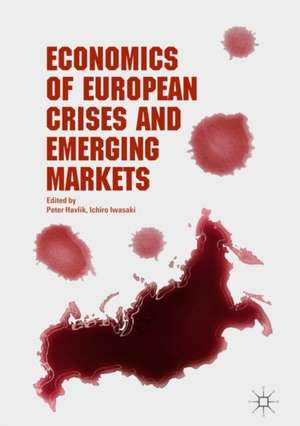Economics of European Crises and Emerging Markets
Editat de Peter Havlik, Ichiro Iwasakien Limba Engleză Hardback – 29 aug 2017
| Toate formatele și edițiile | Preț | Express |
|---|---|---|
| Paperback (1) | 726.06 lei 6-8 săpt. | |
| Springer Nature Singapore – 13 dec 2018 | 726.06 lei 6-8 săpt. | |
| Hardback (1) | 731.28 lei 6-8 săpt. | |
| Springer Nature Singapore – 29 aug 2017 | 731.28 lei 6-8 săpt. |
Preț: 731.28 lei
Preț vechi: 891.81 lei
-18% Nou
Puncte Express: 1097
Preț estimativ în valută:
139.97€ • 152.09$ • 117.65£
139.97€ • 152.09$ • 117.65£
Carte tipărită la comandă
Livrare economică 21 aprilie-05 mai
Preluare comenzi: 021 569.72.76
Specificații
ISBN-13: 9789811052323
ISBN-10: 9811052328
Pagini: 263
Ilustrații: XXIV, 308 p. 43 illus., 18 illus. in color.
Dimensiuni: 148 x 210 mm
Greutate: 0.55 kg
Ediția:1st ed. 2017
Editura: Springer Nature Singapore
Colecția Palgrave Macmillan
Locul publicării:Singapore, Singapore
ISBN-10: 9811052328
Pagini: 263
Ilustrații: XXIV, 308 p. 43 illus., 18 illus. in color.
Dimensiuni: 148 x 210 mm
Greutate: 0.55 kg
Ediția:1st ed. 2017
Editura: Springer Nature Singapore
Colecția Palgrave Macmillan
Locul publicării:Singapore, Singapore
Cuprins
1. Macroeconomic Impacts of the Crisis on European Emerging Markets.- 2. The Financial Effects of the Crisis in European Emerging Markets.- 3. Effects of the Global Economic Crisis on FDI Inflow in Eastern European Economies: A Panel Data Analysis.- 4. Employment in the Czech Republic: Trends during Economic Transition and the Global Recession.- 5. FDI and Ownership in Czech Firms: Pre- and Post-crisis Efficiency.- 6. Impacts of the Crisis on the FDI-led Development Model in Hungary: Emergence of Economic Patriotism or Shift from the Competition State to Patronage?.- 7. Impact of Global Companies’ Real Options Implementation on Their Hungarian Subsidiaries.- 8. Potential Macroeconomic Effects of the Trade Collapse due to Economic and Political Crises: The Case of Poland.- 9. Upstreamness of Employment and Global Financial Crisis in Poland: The Role of Position in the Global Value Chains.- 10. Political Response to the Crisis: The Case of Russia.- 11. The Impact of Crisis on Firm Creation and Regeneration in Russia: Regional Panel Data Analysis.- 12. Conclusions: Crisis Left Deep Scars on European Emerging Markets.
Notă biografică
Peter Havlik is Senior Economist and former Deputy Director at the Vienna Institute for International Economic Studies (wiiw) and guest research scholar at the International Institute for Applied Systems Analysis (IIASA).
Ichiro Iwasaki, formerly a diplomat at Japan's embassy in the Soviet Union during the time it transitioned to the Russian federation, researches post-socialist transition economies at Hitotsubashi University's Research Division of Comparative and World Economics, and has published in Japanese, Russian, and English in a wide range of academic journals.
Ichiro Iwasaki, formerly a diplomat at Japan's embassy in the Soviet Union during the time it transitioned to the Russian federation, researches post-socialist transition economies at Hitotsubashi University's Research Division of Comparative and World Economics, and has published in Japanese, Russian, and English in a wide range of academic journals.
Textul de pe ultima copertă
The recent financial and political crises in the world sent severe shocks through emerging economies in Central and Eastern Europe (CEE) and the former Soviet Union (FSU). Although these crises are regrettable events that caused so much suffering to so many people, we must embrace the opportunity to scrutinize this defining moment in the history of the world economy to learn from it and discover many valuable facts that are of great significance to contemporary economics and the international community. This volume, which explores the economic impact of the crises on emerging markets in the CEE and FSU regions, provides valuable findings that are unique in that they shed new light upon many of the aspects that previous studies have failed to adequately address. The present compendium of papers distinguishes itself from the previous literature in that it also explores how the Russian economy was affected by economic sanctions imposed by the European Union and other nations after the Russian annexation of Crimea in 2014.
Caracteristici
1, Offers a comparative snapshot of post-socialist economies in Eastern Europe 2, Assesses the economic impact of the recent global crises on European emerging markets 3, Explores how Russia was affected by economic sanctions imposed by the EU and US
